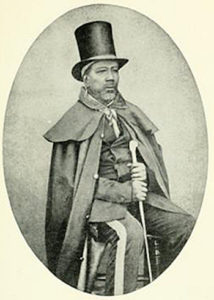
Moeshoeshoe I
*The birth of Moshoeshoe I is celebrated on this date, c. 1786. He was a Black South African leader.
Moshoeshoe I was born at Menkhoaneng in northern Lesotho, South Africa, under Lepoqo. His name's literal translation is Dispute, which originated from accusations of witchcraft against a man in Mekhoaneng around the time of his birth. He was the first son of Mokhachane, a minor chief of the Bamokoteli sub-clan of the Basotho people, and his first wife, Kholu. She was the daughter of the Bafokeng clan chief Ntsukunyane and came from Butha-Buthe further north.
The Bamokoteli numbered at most 4,000 people. They were an offshoot of the Koena tribe to whom they regularly paid tribute. Moshoeshoe's family lived in a small kraal near the Tlotsi stream, a tributary of the Caledon River. Little is known about his childhood; however, he remained on good terms with his parents until their death. Around six, he began tending to the family's sheep and goats. Moshoeshoe had an older sister named MaTsouenyane, younger brothers named Makhabane and Posholi, and a younger sister named 'MaNtoetse. Mokhachane went on to marry over four other women and father other children. The Sotho people were keen pastoralists, and cattle played a central role in their lives, as a man's wealth by the number of cattle he possessed.
Moshoeshoe went to initiation school and got the name Letlama, meaning strong bond. During his youth, just after initiation, he was courageous. He once organized a cattle raid against Ramonaheng and captured several herds. As was the tradition, he composed a poem praising himself where, amongst the words he used to refer to himself, he said he was "like a razor which has shaved all Ramonaheng's beards," referring to his successful raid. In the Sesotho language, a razor makes a "shoe...shoe..." sound, and then he was called Moshoeshoe: "the shaver." He also referred to himself as the person of Kali, showing that he was a descendant of the Great Kali or Monaheng, who is said to be the ancestor of most Bakoena people in Lesotho except for the senior Bamolibeli.
Moshoeshoe established his village at the Butha-Buthe settlement. His reign coincided with the growth in power of the Zulu King, Shaka, in the 'time of troubles.' During the early 19th century, Shaka raided many smaller chiefdoms along the eastern coast of Southern Africa (modern-day Kwa-Zulu Natal), incorporating parts of them into his steadily growing Zulu chiefdom. Various small clans fleed the Zulu chief. An era of great wars of calamity followed, known as the time of troubles/Difaqane. Aggression against the Sotho people by the invading Nguni clans marked it.
The attacks also forced Moshoeshoe to move his settlement to the Qiloane plateau. The name was later changed to Thaba Bosiu or "mountain at night" because it grew and shrank during the day. It proved to be an impassable stronghold against enemies. By the latter part of the 19th century, Moshoeshoe established the nation of the Basotho in Basutoland. He was popularly known as Morena e Moholo/morena oa Basotho (Great King/King of the Basotho). Moshoeshoe Day is an annual national holiday in Lesotho celebrated on March 11, the date of Moshoeshoe's death in 1870.
Celebrations include a delegation led by Lesotho's monarch laying wreaths on Moshoeshoe's grave at Thaba Bosiu, a celebratory parade, and other entertainment activities. The Moshoeshoe I International Airport, Lesotho's only international airport, is named in his honor. South African-made shweshwe fabric is named for King Moshoeshoe I, who once received a gift and popularized it throughout his realm.